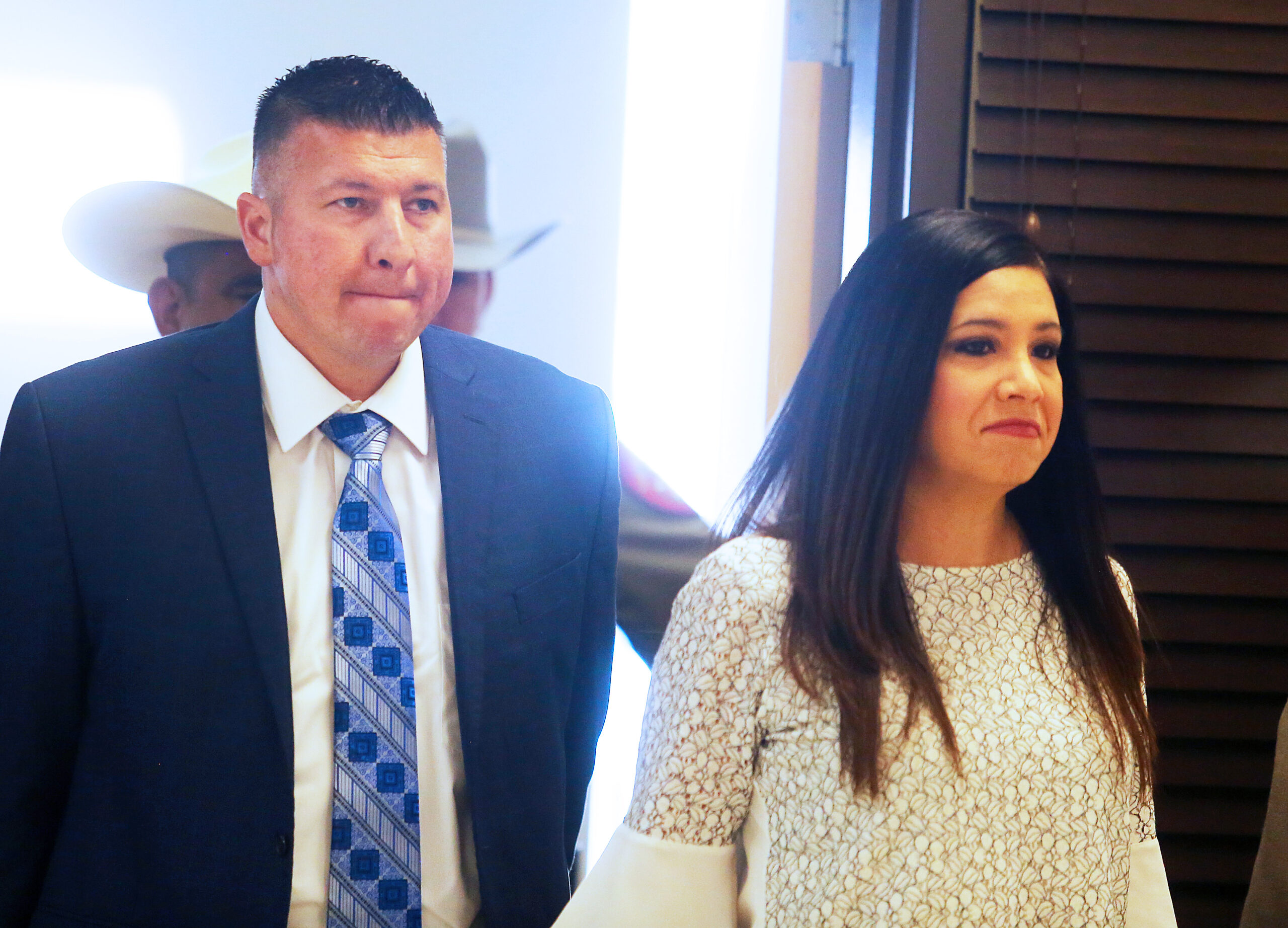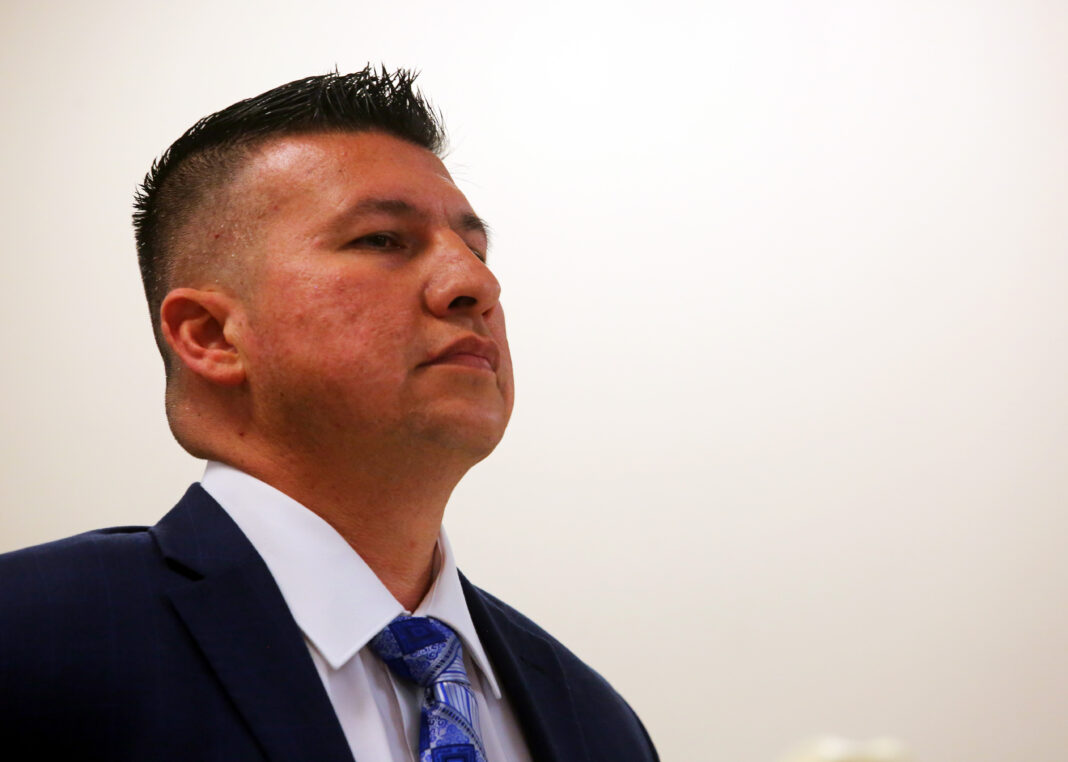BY BERENICE GARCIA AND MARK REAGAN | STAFF WRITERS
Edinburg Mayor Richard Molina walked into the city’s municipal auditorium with a wide smile, generously high-fiving members of the audience as he made his way toward the stage to the tune of Flo Rida’s “My House.”
Following close behind him was professional boxer Eric Molina and, next to him, another man carrying two boxing title belts above the mayor’s head.
The message was clear — Richard Molina was a winner.
And on the surface, at least, it rang true. Just five months earlier, in November 2017, Molina had defeated former Mayor Richard Garcia by more than 1,200 votes to become the city’s next mayor.
It was a definitive victory over Garcia who had served more than a decade in office, and Molina was riding high.
Things changed the following month after a handful of Molina’s supporters were arrested by the Texas Rangers on illegal voting charges.
Accusations of fraud during the November 2017 election had already been swirling for months but in May, after the arrests, Molina took to social media to rebuff allegations of wrongdoing.
Less than a year later, Molina and his wife, Dalia Molina, were arrested as a result of the investigation that would later result in an indictment alleging 11 counts of voter fraud and a count of engaging in organized election fraud. Dalia would be indicted on two counts of illegal voting and one count of engaging in organized election fraud.
Molina’s case was scheduled to go to trial on June 1, 2020, but that day has since come and again with little movement after the COVID-19 pandemic caused the suspension of jury trials in Hidalgo County along with the rest of the country.
But as COVID-19 hospitalizations continue to decrease and more people become vaccinated, jury empanelments are resuming this week followed by potential November jury trials.
That development prompted the Hidalgo County District Attorney’s Office to ask for a jury trial date, which happened one week before early voting in Molina’s reelection bid, requiring the mayor to appear in court for his first hearing in 19 months.
THE ALLEGATIONS
While the mayor was enjoying his first year in office, investigators with the Texas Attorney General’s Office and the Texas Rangers began secretly interviewing at least seven people swept into the alleged scheme.
All of those people, who remain anonymous in the affidavits for Molina’s arrest, told similar stories.
Either Molina or his wife, who were volunteer registrars, approached them and helped them fill out voter applications to show that they lived in Edinburg when they did not live in the city, according to law enforcement.
The cooperating co-conspirators told investigators that Molina told them they would be allowed to vote in the election and were encouraged by Molina to do so.
Those individuals are identified as CCW1 through CCW7. The acronym stands for cooperating co-conspirator/witness.
The affidavits also detail stories told by two people who are only identified as Person A and Person B, who both told investigators they changed their voter registration address to make it appear as though they could vote in the municipal election, though they knew they were not eligible to do so, according to the affidavits.
“Person A stated that on or about October 10, 2017, Defendant Richard Molina, approached Person A at Person A’s work place in Edinburg, Texas and encouraged Person A to falsely report Person A’s voter registration residential address at a residence where Person A did not reside,” the affidavits state.
“Person A stated that Person A was intimidated by Defendant Richard Molina and that Person A would have never falsely reported Person A’s voter registration residential address on the voter registration application if Defendant Richard Molina would not have approached and solicited Person A to do so.”
Person A also told investigators that the voter registration application was allegedly already filled out when Molina presented it to them for their signature, according to the affidavit.
Furthermore, Person A said they told Molina they did not live in Edinburg and the mayor allegedly reassured them that they would not be held to account, according to investigators.
Person B told a similar story, but alleged Dalia helped out with the voter registration and that Person B changed their voter registration address to their parents’ house in order to vote for Molina.

WHERE WE ARE NOW
Following the first slew of arrests in May 2018, the mayor took to Facebook where, in an eight-minute video, he questioned the investigation and lobbed his own accusations of voter fraud against the Palacios family.
“I think it’s time for me to address the investigation into voter fraud happening in Edinburg,” he said in late May 2018. “My supporters have become the targets of this investigation. That’s why I want the whole story to be told publicly.”
In that video, Molina took aim at former Hidalgo County Justice of the Peace Mary Alice Palacios, who filed a complaint with the Secretary of State’s Office a month after the 2017 election.
“Her motive is simple,” Molina said. “She’s a disgruntled former vendor who has a personal vendetta against me.”
Fast forward to last Wednesday and this allegation, and more, are now the basis for a request from Molina’s attorney to disqualify the DA from the case.
The motion to disqualify, filed by defense attorney Carlos A. Garcia, alleges Hidalgo County District Attorney Ricardo Rodriguez Jr. and his staff should be disqualified from prosecuting or investigating the case because Rodriguez is an extended member of the Palacios family.
Mary Alice is Rodriguez’s aunt.
That motion became the subject of a sometimes heated status hearing Thursday morning in front of visiting Judge Carlos Valdez.
But they also discussed another motion, one filed by the DA’s office a week prior, that prompted Thursday’s hearing in the first place — one that requested setting a new trial date for the case.
Lead prosecutor Michael Garza filed that motion a week before early voting began, a detail that led Garcia to accuse the DA’s office of trying to undermine the will of Edinburg voters.
However, Garza argued that he filed the motion only after a decision by the Hidalgo County Board of Judges that allowed for the empanelment of juries followed by trials as of Nov. 1.
Before then, in-person hearings and jury trials are, and have been, on hold as a precautionary measure in the face of the COVID-19 pandemic.
Molina’s last court hearing was held in March 2020, right before the pandemic gripped the Rio Grande Valley.
During Thursday’s hearing, Valdez, the judge, declined to set a jury trial date, wanting to first address the motion to disqualify the DA’s office.
Pointing out the allegations in the motion to disqualify were serious and required an evidentiary hearing, Valdez scheduled such a proceeding on Nov. 15.
About an hour after the court hearing, following a change of clothes, Molina was just north of the courthouse near the Hidalgo County Courthouse Annex III, across the street from the Hidalgo County Election Administration building, back to campaigning and making his pitch to voters.
With early voting in full swing, the area is lined with various political signs and supporters. It is one of the busiest early voting locations in the county.
“If you haven’t had a chance to vote I’m going to ask you to please come so that we can keep the progress in Edinburg,” he said in a Facebook Live.
[email protected] | [email protected]




